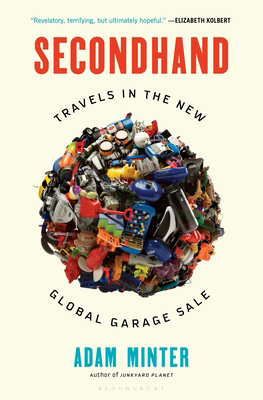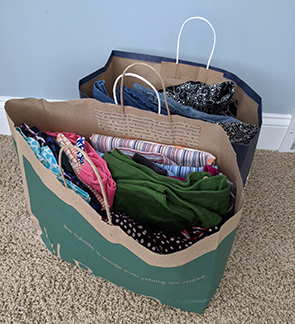While I’ve seen numerous articles stating that the COVID-related stay-at-home orders in many states prompted a flurry of spring decluttering—followed by trips to thrift stores to unload the excess goods—my own streamlining process began before the pandemic hit.

“Secondhand: Travels in the New Global Garage Sale” by Adam Minter (Bloomsbury Publishing, 2019)
A couple of years had passed since I last did a serious purge. So, over the winter, I began neatly folding and bagging ill-fitting and unwanted clothes, pondering where to donate them once my reorganization was complete.
Then, in mid-March, life shifted rapidly. By March 16, we Sea Grant staffers were working from home. Work attire and comfy at-home attire became one and the same. Nationwide consumer spending on clothing took a hit (down by a whopping 78% for the month of April). Not only were people not going places, but their consumer confidence had tumbled.
It was in this environment—my own personal tidying project and this larger global picture—that I read Adam Minter’s book “Secondhand: Travels in the New Global Garage Sale” (Bloomsbury Publishing, 2019) in April.
Minter is a Great Lakes native, a Minnesota-raised journalist who specializes in recycling and the global trade in used goods. He grew up around his family’s scrap business in the Twin Cities. His book takes the reader to places as varied as Japan, Ghana and the more prosaic settings of the Minneapolis suburbs. One chapter focuses on an antique mall in Stillwater, Minnesota, just across the St. Croix River from Wisconsin.
Minter looks at where the things we no longer need—clothes, furniture, electronics and more—wind up, especially if they don’t sell at places like Goodwill. What are the next stops on their journey? Where do they eventually land? And how can durable, repairable, high-quality used goods play a vital role in the global economy? The author offers a detailed look at a world that goes unseen by many.
Personally, I have always been interested in the life of things. I wondered how to integrate the issues we address here at Wisconsin Sea Grant and the Water Resources Institute, what I learned from Minter’s book, and my evolving thoughts on consumption brought about by the pandemic.
One possible thread is this: water is an integral part of our consumption decisions, whether we realize it or not.
I thought back to a lecture Sandra Postel gave in Madison in 2013. Postel, director of the Global Water Policy Project, is an internationally known speaker on water issues. I helped organize her talk on behalf of the Wisconsin Academy of Sciences, Arts and Letters, where I worked at the time.
One of most vivid examples in Postel’s talk has stuck with me over the years: it takes 700 gallons of water to make a single cotton T-shirt, mostly due to the large amount of water it takes to grow the cotton. How many of us have closets full of T-shirts, some of which are seldomly worn?

Just two of the bags of clothes awaiting their trip to a local thrift store. (Photo: Jennifer Smith)
While I’m far from being an exemplary eco-conscious consumer, it’s stories like these that sometimes give me pause and avoid buying something I don’t need—as well as knowing that, someday, I will just have to get rid of it.
As Postel said in her talk, “Our choices as consumers can make a difference, especially if we multiply those choices many times.” If the top billion of the world’s consumers bought just two fewer cotton T-shirts each year, she noted, it would save enough water to feed five million people. (Food production also makes up a major part of our water footprint.)
And, as Minter points out, while we’d like to think our no-longer-needed items will hold value for someone else and find a second use, perhaps even right in our own community, this is often not the case. While secondhand markets do seek high-quality goods, including repairable items like electronics, a flood of low-quality goods is not needed.
The world of “stuff” is a complex place, both economically and environmentally (and, as the pandemic has reinforced, in terms of worker safety as well). I’m thinking more carefully about my role in that life cycle of stuff.
While having the range of consumer choices that I do is a mark of privilege, it is also a chance for me to evaluate what I do and don’t need and how my choices affect other people and our planet. “Secondhand: Travels in the New Global Garage Sale” is a worthwhile and informative read for challenging times.


